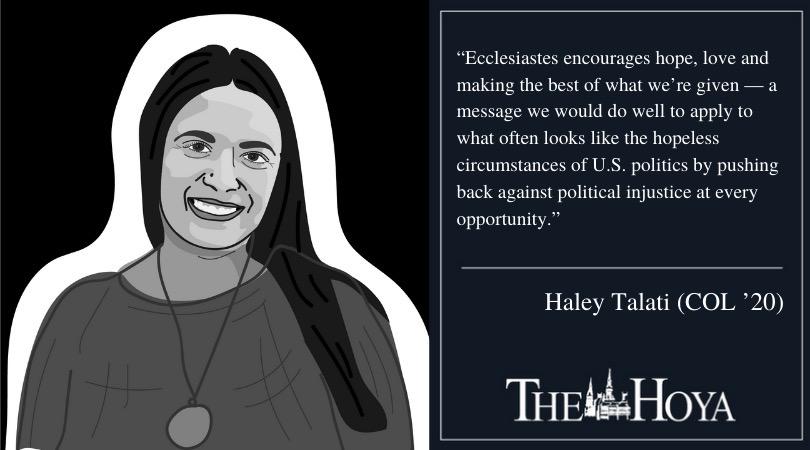“What has been is what will be, and what has been done is what will be done; there is nothing new under the sun” (Ecclesiastes 1:9).
Ecclesiastes, one of the Bible’s most lyrically brilliant books, has an unfair reputation for being dark and demoralizing. On the surface, it isn’t hard to see why — the text extensively discusses the fleetingness and vanity of life, the frustrations and disillusionments that come with it, and the endless, predictable nature of all things.
But a closer look at the text reveals a far more optimistic view of the world and of human nature. Far from succumbing to despair over the limitations of human existence, Ecclesiastes encourages hope, love and making the best of what we’re given — a message we would do well to apply to what often looks like the hopeless circumstances of U.S. politics by pushing back against political injustice at every opportunity.
At the heart of Ecclesiastes is an ode to the collective nature of the human experience, a reminder that even the cycles of death and grief are universally shared. The writer of Ecclesiastes may repeatedly assert that “all is vanity” (Ecclesiastes 1:1), but underneath that claim lies the implicit message, “so why not make the best of it while we can?” The book’s appreciation for the many ways of finding contentment in life serves as a powerful reminder of the importance of seizing each opportunity to live meaningfully.
Ecclesiastes emphasizes human agency just as much as it does futility, and it mandates seeking fulfillment in life: “There is nothing better than that all should enjoy their work, for that is their lot” (Ecclesiastes 3:22). In other words, the limits of the world should not be understood to promote an entirely disheartened outlook but instead to encourage acceptance and passion.
Even through this more positive lens, the text may seem to contain a note of resignation. If anything, that makes the political parallel even stronger. Americans are not working with a perfect system. Religious texts and beliefs shouldn’t influence secular policy at all, but conservatives have spent decades allowing religion to play a significant role in our system. All we can do is make the best of the consequences, as Ecclesiastes recommends. So, for the past three months, I’ve tried to highlight the Bible’s potential to support progressive politics.
Developing this potential more fully will be critical for finding new ways to challenge harmful conservative policies like the ones that have been enacted under the Trump administration. Throughout his time in office, women have faced restrictions on their reproductive freedom. The United States has weakened its commitment to fighting climate change. Gun violence prevention bills have been blocked. The list goes on.
The effects of the past three years have been devastating, but the message of Ecclesiastes offers a means of responding to them. It’s easy to become desensitized to each new horror, but our takeaway from President Donald Trump’s actions must be a mandate against complacency. The barriers to progressives’ ability to influence policy under this administration don’t exempt us from our obligation to do everything we can to push back against the harms it commits — whether that happens through protests, campaigning or simply calling out injustice when we see it — and to try to find some moral fulfillment in that process. In doing so, we can try to fulfill Ecclesiastes’ instructions by living more meaningfully, hopefully in a way that improves our political system.
The first time I thought about applying to write this column, I imagined it would take a very different shape — perhaps one more focused on a rejection of allowing religion to influence politics at all. Instead, throughout the semester, I’ve argued for progressive rereadings of misunderstood biblical passages, and that approach has been the culmination of a significant shift in my personal views of the Bible over the past four years. During my time at Georgetown University, I’ve started to see that biblical interpretation is a matter of not just finding the best or deepest meaning of the text, but also of having the will to see the potential for good even in those things that have historically been exploited for evil or pessimistic ends, as the Bible undeniably has. This fight for optimism keeps with the general spirit of Ecclesiastes as well — or at least with the one I’d like to believe in.
Haley Talati is a senior in the College. Between the Lines appears online every other Thursday.



















